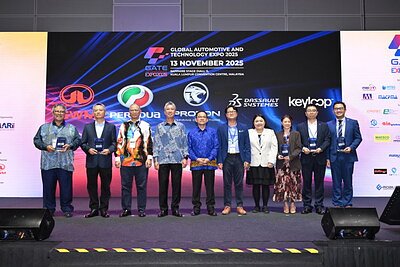
Malaysia Drives Toward EV Hub Status Amidst Regional Competition
As Southeast Asia accelerates its EV transition, Malaysia is positioning itself as a regional hub, bolstered by government incentives and a burgeoning local ecosystem – but faces stiff competition from Thailand, Indonesia, and Vietnam.
Malaysia Drives Toward EV Hub Status Amidst Regional Competition
Kuala Lumpur, Malaysia – Malaysia is intensifying its efforts to become a leading electric vehicle (EV) hub in Southeast Asia, leveraging government incentives, strategic partnerships, and a growing domestic ecosystem. The ambition is being showcased through events like GATE 2025 – a new automotive technology exhibition – but the path to success is paved with fierce competition from regional powerhouses like Thailand, Indonesia, and Vietnam.
GATE 2025, organized by the Malaysia Automotive, Robotics and IoT Institute (MARii) and scheduled to launch later this year, aims to attract investment, foster innovation, and accelerate the adoption of EVs and related technologies. The event will feature an OEM-Vendor Automotive Exchange (GATE Connect) and a high-level industry conference focusing on critical areas such as semiconductors, hydrogen mobility, and AI-driven vehicle systems.
“The goal is to position Malaysia as a proving ground for new automotive technologies and a key player in the global EV supply chain,” explained a source familiar with MARii’s strategy. “We’re not just aiming to assemble cars; we want to build a complete ecosystem that supports design, engineering, manufacturing, and maintenance.”
Government Incentives Fueling Growth
The Malaysian government has implemented a range of incentives to encourage EV adoption and attract investment. These include tax exemptions for imported and locally assembled EVs, subsidies for charging infrastructure, and financial assistance for local manufacturers. However, the expiration of some of these incentives at the end of 2025 is creating some uncertainty.
“The government recognizes the need to provide long-term certainty to investors,” a source within MITI (Ministry of Investment, Trade and Industry) stated. “We are working on a new customized incentive mechanism that will provide a more transparent and attractive framework for investment in the automotive sector.”
MITI is also prioritizing the localization of the EV supply chain, encouraging foreign manufacturers to establish local assembly plants and source components from Malaysian suppliers. This effort is being supported by financial incentives and technical assistance.
Competition Heats Up in Southeast Asia
While Malaysia is making significant strides, it faces intense competition from other Southeast Asian nations vying for EV leadership. Thailand currently leads the region in EV market penetration and manufacturing capacity, attracting substantial investment from both established automakers and Chinese EV manufacturers.
“Thailand has a head start, particularly in terms of established manufacturing infrastructure and supply chains,” noted an industry analyst. “However, Malaysia has the potential to differentiate itself by focusing on high-value segments such as advanced manufacturing, software development, and electric vehicle charging solutions.”
Indonesia is leveraging its abundant nickel reserves to become a major hub for EV battery manufacturing. The Indonesian government is offering incentives to attract investment in battery production and is actively promoting the development of a domestic battery ecosystem.
Vietnam is experiencing rapid EV adoption, driven by the success of domestic manufacturer VinFast. The Vietnamese government is also providing incentives to encourage EV adoption and is promoting the development of a local EV supply chain.
Challenges and Opportunities
Despite the promising outlook, Malaysia faces several challenges in its quest to become an EV hub. These include a relatively small domestic market, a lack of skilled labor in certain areas, and the need to develop a robust charging infrastructure.
“The charging infrastructure is a major bottleneck,” said an EV owner. “There are not enough charging stations, and the ones that are available are often poorly maintained.”
Another challenge is the high cost of EVs, which remains a barrier to adoption for many Malaysians.
“EVs are still too expensive for the average Malaysian,” said a consumer advocate. “The government needs to provide more financial incentives to make EVs more affordable.”
Despite these challenges, Malaysia has several opportunities to differentiate itself. These include its strategic location, its well-developed infrastructure, and its skilled workforce.
“Malaysia has the potential to become a regional center for EV research and development,” said a technology expert. “We have a strong engineering talent pool and a growing innovation ecosystem.”
Furthermore, Malaysia can leverage its strengths in areas such as advanced manufacturing, software development, and electric vehicle charging solutions. By focusing on these areas, Malaysia can carve out a niche for itself in the global EV market.
Localizing the Supply Chain: A Critical Focus
Recognizing the importance of a robust local ecosystem, the government is actively incentivizing the localization of the EV supply chain. Recent initiatives include financial assistance for local manufacturers of EV components and tax breaks for foreign companies that establish local assembly plants. This commitment extends to the crucial area of charging infrastructure, with a RM11.2 million investment planned over three years to boost local production of charging systems.
“The goal isn't just to assemble vehicles here; it's to create a fully integrated supply chain that spans design, engineering, manufacturing, and maintenance,” explained a source within MITI. “This will not only create jobs but also enhance our competitiveness and resilience.”
Looking Ahead
The road to becoming an EV hub will be challenging, but Malaysia has the potential to succeed. By continuing to invest in infrastructure, incentivize innovation, and foster a collaborative ecosystem, Malaysia can position itself as a leading player in the global EV market. GATE 2025 will serve as a critical platform to showcase these efforts and attract investment from around the world. However, sustained commitment and proactive policy-making will be essential to navigate the evolving landscape and secure Malaysia’s position in the competitive Southeast Asian EV arena.
